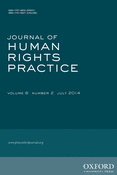Interpreting Conflict: Training Challenges in Humanitarian Field Interpreting
 Barbara Moser-Mercer, Leïla Kherbiche and Barbara Class*
Barbara Moser-Mercer, Leïla Kherbiche and Barbara Class*
Journal of Human Rights Practice (2014) 6(1): 140-158.
doi: 10.1093/jhuman/hut025
Abstract
When communication breaks down, conflict ensues. Resolving conflicts successfully relies heavily on re-establishing communication. Almost all conflicts involve parties who do not speak the same language or share the same culture. Language is the main vehicle of communication under such difficult circumstances, and yet there are few professional interpreters in the field to mediate between languages and cultures. This policy and practice note outlines a novel approach to training humanitarian interpreters in the field through the use of new technologies and an innovative pedagogical design developed by the Centre for Interpreting in Conflict Zones (InZone). It concludes by sketching a sustainable training model that leverages innovative pedagogy and new technologies for building interpreting capacity in the field.